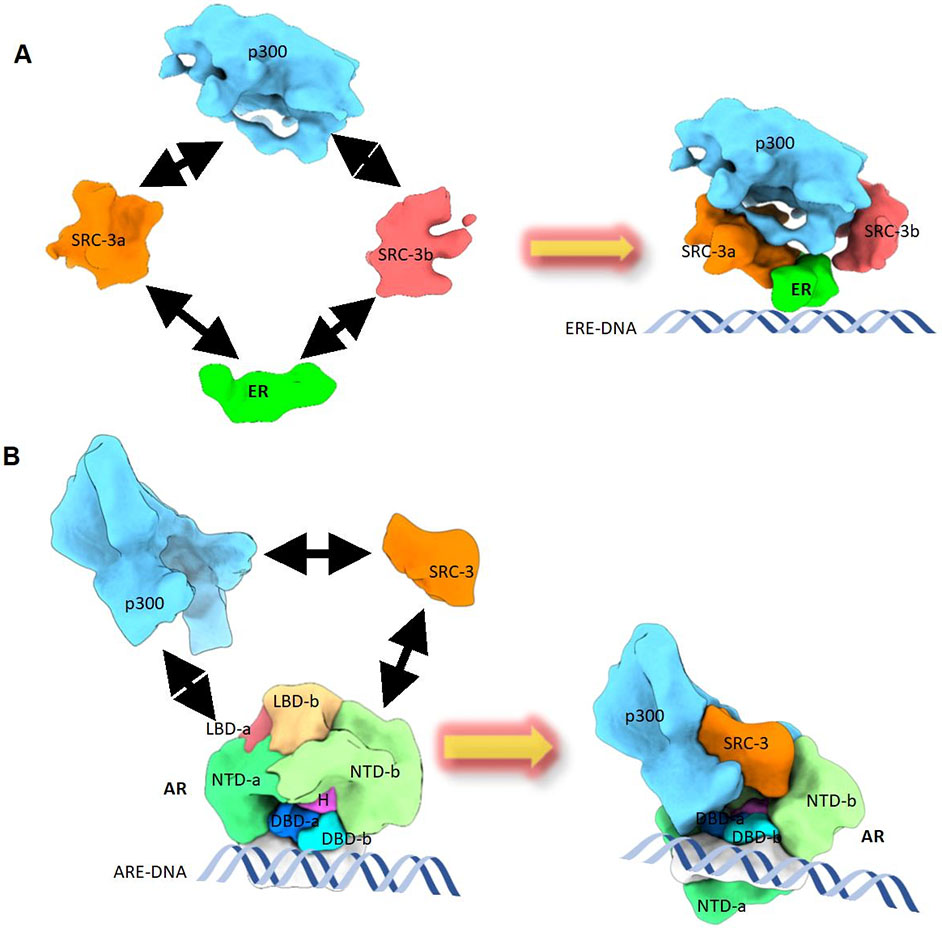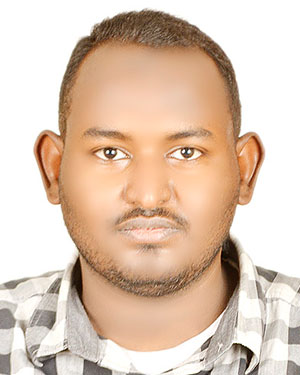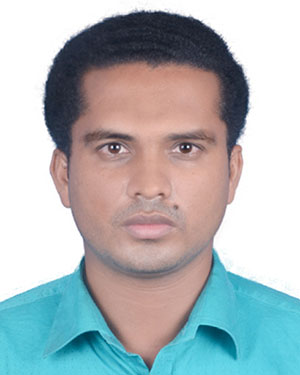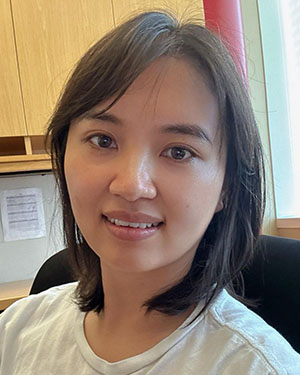Yi Lab
Ping Yi, Ph.D.
Assistant Professor, Biochemistry
Department of Biology and Biochemistry
Office: SERC, 3021 - 713-743-7230
Contact: pyi3@central.uh.edu
Dr. Ping Yi’s lab research has been focused on molecular regulation of oncogene activation in cancer, with a particular focus on post-translational modification and signal transduction pathways, and nuclear receptor structural studies. Current studies aim to explore the role of non-proteolytic ubiquitination in prostate and lung cancer development and progression. The lab employs diverse tools for the studies, including transgenic mouse models, xenograft tumor models and a variety of molecular biology and cell biology tools. Another interest of the lab is to understand the structure and function of nuclear receptor-coregulator complexes. They are the first group to use cryo electron microscopy (Cryo-EM) to determine the quaternary structures of DNA-bound estrogen receptor alpha and androgen receptor with Steroid Receptor Coactivator (SRC-3) and a secondary coactivator (p300) complexes. Combining cryo-EM structural approach and biochemical analysis, they have elucidated a series of nuclear receptor complex structures.

Figure: CryoEM structures reveal different assembly mechanisms for estrogen receptor and androgen receptor to recruit coactivators to activate target gene transcription. (A) The structural assembly of DNA-bound ERa, with coactivators (Steroid Receptor Coactivator-3 (SRC-3) and p300) complex. ERa recruits two SRC-3s (-a and -b) and the two SRC-3s interact with different regions of p300 to bring in p300 to the ERa binding site. (B) The structural assembly of DNA-bound AR, SRC-3, and p300 complex. AR interacts directly with one SRC-3 and one p300. The AR NTD-b (N-terminal domain-b) is solely responsible for SRC-3 recruitment. Both AR NTDs are major contributors for p300 recruitment. Small areas of LBDs (Ligand-binding domain) also interact with p300. The arrows indicate the interaction between different proteins.

Ping Yi, Ph.D.
Assistant Professor, Biochemistry
Department of Biology and Biochemistry
University of Houston
Houston, Texas 77204-5001
Office: SERC, 3021
Phone: 713-743-7230
pyi3@central.uh.edu

Amy Whitener
Research Associate

Mosab Gasemelseed
Graduate Student

MD Sakib Hossen
Graduate Student

MD Yousef Ali
Graduate Student
Arif Mazia
Graduate Student
marif3@cougarnet.uh.edu
Alumni

Xin Liu
Visiting Scholar
- Lu, D., Chen, J., Qin, L., Bijou, I., Yi, P., Li, F., Song, X., MacKenzie, K. R., Yu, X., Yang, B., Chowdhury, S. R., Korp, J.D., O’Malley, B. W., Lonard, D. M., Wang, J. Lead Compound Development of SRC-3 inhibitors with Improved Pharmacokinetic Properties and anticancer efficacy. J. Med. Chem. (2024) 67, 5333-5350.
- Lumahan, L.E.V., Arif, M., Whitener, A. E., Yi, P. Regulating androgen receptor function in prostate cancer: exploring the diversity of post-translational modifications. Cells (2024) 13 (2), 191.
- Arif, M., Yi, P. APOBEC3 deaminase drives acquired anticancer targeted therapy resistance. Tanslational Surgical Oncology (2023) 1 (2).
- Han, D., Wang, W., Jeon, J. H., Shen, T., Huang, X., Yi, P., Dong, B., Yang, F. Cooperative activation of PDK1 and AKT by MAPK4 enhances cancer growth and resistance therapy. PLoS Biology (2023) 21, e3002227.
- Singh, R., Meng, H., Shen, T., Lumahan, L.E.V., Nguyen, S., Shen, H., Dasgupta, S., Qin, L., Karri, D., Zhu, B., Yang, F., Coarfa, C., O’Malley, B. W., Yi, P. TRAF4-mediated non-proteolytic ubiquitination of androgen receptor promotes castration-resistant prostate cancer. Proc Natl Acad Sci U S A. (2023) 120 (20) e2218229120.
- Yu, X*., Yi, P*., Panigrahi, A. K., Lumahan, L. E. V., Lydon, J. P., Lonard, D. M., Ludtke, S. J., Wang, Z., O'Malley, B.W. Spatial definition of the human progesterone receptor-B transcriptional complex. iScience (2022) 25, 105321. (*equal contribution).
- Wang, W., Han, D., Cai, Q., Shen, T., Dong, B., Lewis, M. T., Wang, R., Meng, Y., Zhou, W., Yi, P., Creighton, C. J., Moore, D. D., Yang, F. MAPK4 expression in a large subset of triple-negative breast cancer promotes tumor growth and resistance to PI3K blockade. Nature Commun. (2022) 13, 245.
- Yi, P., Yu, X., Wang, Z., O'Malley, B. W. Steroid receptor-coregulator transcriptional complexes: new insights from CryoEM. Essays Biochem. (2021) 65, 857–866.
- Yu, W., Singh, R., Wang, Z., O'Malley, B. W., Yi, P. The E3 ligase TRAF4 promotes IGF signaling by mediating atypical ubiquitination of IRS-1. J. Biol. Chem. (2021) 296, 100739.
- Yu, X*., Yi, P*., Hamilton, R. A., Shen, H., Chen, M., Foulds, C. E., Mancini, M. A., Ludtke, S. J., Wang, Z., O’Malley, B. W. Structural Insights of Transcriptionally Active, Full-Length Androgen Receptor Coactivator Complexes. Mol. Cell (2020) 79, 812-823. (*equal contribution)
- Panigrahi, A.K., Foulds, C.E., Lanz, R.B., Hamilton, R.A., Yi, P., Lonard, D.M., Tsai, M.J., Tsai, S.Y., O'Malley, B.W. SRC-3 Coactivator Governs Dynamic Estrogen-Induced Chromatin Looping Interactions during Transcription. Mol. Cell (2018) 70, 679-694.
- Singh, R., Karri, D., Shen, H., Shao, J., Dasgupta, S., Huang, S., Edwards, D.P., Ittmann, M.M., O'Malley, B.W., Yi, P. TRAF4-mediated ubiquitination of NGF receptor TrkA regulates prostate cancer metastasis. J Clin. Invest. (2018) 128, 3129-3143.
- Dasgupta, S., Rajapakshe, K., Zhu, B., Nikolai, B. C., Yi, P., Putluri, N., Choi, J. M., Jung, S. Y., Coarfa, C., Westbrook, T. F., Zhang, X. H., Foulds, C. E., Tsai, S. Y., Tsai M. J., O'Malley, B. W. Metabolic enzyme PFKFB4 activates transcriptional coactivator SRC-3 to drive breast cancer. Nature (2018) 556, 249-254.
- Yi, P., Wang, Z., Feng, Q., Chou C. K., Pintilie, G. D., Shen, H., Foulds, C. E., Fan, G., Serysheva, I., Ludtke, S. J., Schmid, M. F., Hung, M. C., Chiu, W., O'Malley, B. W. Structural and Functional Impacts of ER Coactivator Sequential Recruitment. Mol. Cell (2017) 67:733-743.
- Yi, P., Wang, Z., Feng, Q., Pintilie, G. D., Foulds, C. E., Lanz, R. B., Ludtke, S. J., Schmid, M. F., Chiu, W., O’Malley, B. W. The Structure of a Biological Active Estrogen Receptor-Coactivator Complex on DNA. Mol. Cell (2015) 57, 1047-1058.
- He, B., Lanz, R. B., Fiskus, W., Geng, c., Yi, P., Hartig, S. M., Rajapakshe, K., Shou, J., Wei, Li., Shah, S. S., Foley, C., Chew, S. A., Edunun, V. K., Bedoya, d. J., Feng, Q., Frolov, a., Weigel, N. L., Hilsenbeck, S. G., Palzkill, T. G., Ittmann, M. M., Song, Y., Coarfa, C., O’Malley, B. W., Mitsiades, N. GATA2 facilitates steroid receptor coactivator (SRC) recruitment to the androgen receptor (AR) complex in prostate cancer cells. Proc. Natl. Acad. Sci USA (2014) 111, 18261-18266.
- Yi, P., Xia, W., Wu, R. C., Lonard, D. M., Hung, M. C., O'Malley, B. W. SRC-3 Coactivator Regulates Cell resistance to Cytotoxic Stress via TRAF4-mediated p53 De-stabilization. Genes & Dev. (2013) 27, 274-287.